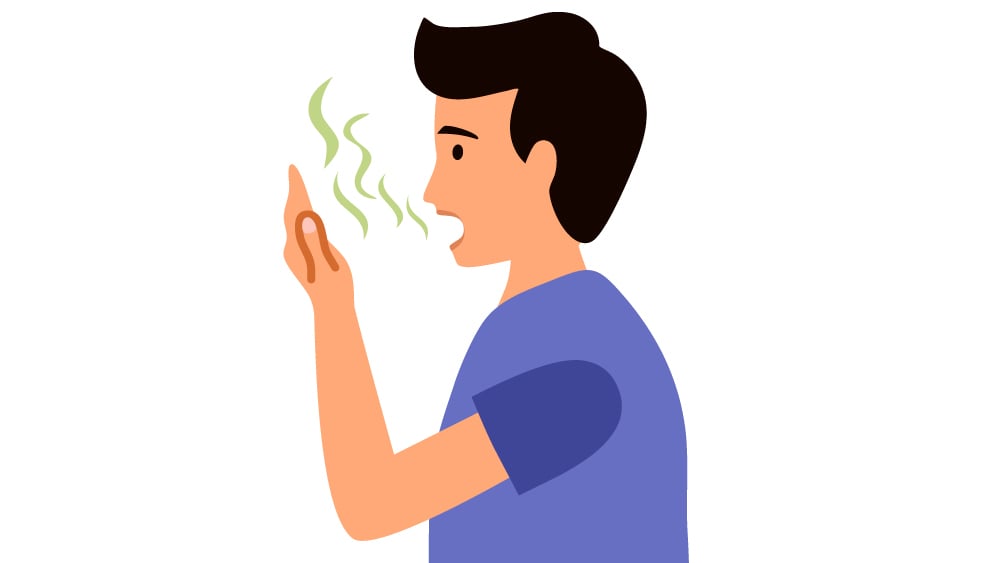In defending our mouths and preventing bacterial growth, saliva is crucial. Saliva plays an essential role in removing food debris and preventing bacteria in the mouth from growing.
As we produce less saliva when we're fasting, we're less shielded from the oral germs that might cause bad breath (or halitosis1). In other words, bacteria in the mouth will grow faster when saliva production is reduced, leading to bad breath. Bad breath is a result of bacteria being able to produce odorous gases.
After you break your fast, your salivary glands will start to stimulate again and battle these bacteria.
In addition to a deficiency in salivation can cause dry mouth and bad breath, some other causes include poor oral hygiene, dentures that have not been properly cleaned, smoking, particular foods, and/or some underlying conditions2.
So, how can you avoid bad breath during the holy month of Ramadan?
Here are some suggestions3 to help you keep your mouth healthy throughout Ramadan and eliminate bad breath while fasting:
Brush your teeth twice daily: To prevent plaque buildup, brush your teeth with fluoride toothpaste for two to three minutes after iftar and suhoor. By brushing your teeth, you can help prevent bad breath by removing food particles and bacteria.
Utilize Interdental Aids: Floss and interdental brushes can be used every day to clean the spaces in between your teeth that your toothbrush can't. By removing food particles and plaque from in between your teeth and along your gumline using floss, you can lower your risk of gum disease.
Clean Your Tongue: To prevent oral bacteria from accumulating on your tongue and to maintain oral health, use a tongue scraper. Regular tongue cleaning is crucial because bacteria on the tongue can cause bad breath.
Give your saliva some time to do the work: Wait 30–60 minutes after breaking your fast before brushing your teeth. This will give your saliva a chance to naturally wash away any meal particles and give your mouth time to recover to its usual pH level. Cleaning your teeth right away after consuming acidic meals can weaken your enamel, which can lead to damage.
Avoid certain foods: When breaking your fast, stay away from foods like onions, garlic, and spices as they might create bad breath. Volatile substances found in these foods have a tendency to stay in the mouth and produce unpleasant odors. Try to consume more foods that are high in water content instead, such as celery, cucumbers, and watermelon, which can aid in flushing out bacteria and food particles.
Drink water: Water is important during non-fasting hours since it keeps you hydrated and aids in flushing out food particles that would otherwise contribute to bad breath. At least 8 to 10 cups of water should be consumed between iftar and suhoor. To keep your mouth moistened during iftar, you can also eat fruits and vegetables that are high in water content.
Reduce caffeine and sugary beverages: Caffeinated beverages, such as tea and coffee, have a diuretic impact that can cause dehydration. Sugary beverages can also cause foul breath by encouraging the growth of bacteria in the mouth. Use water or herbal teas as an alternative.
See your dentist frequently: To make sure that your teeth and gums are healthy, make an appointment with the dentist before and after Ramadan.
There are additional steps you can take to preserve good dental health while fasting throughout Ramadan in addition to the ones described above. These suggestions can help you maintain oral health while fasting and prevent bad breath.
Use mouthwash: Using an alcohol-free mouthwash twice a day can aid in the eradication of the foul breath-causing germs. It's vital to look for an alcohol-free solution such as Listerine® Total Care Miswak because alcohol can dry out your mouth and exacerbate foul breath.
Keep some sugar-free gum in handy: Gum without sugar can increase saliva production, which can aid in removing oral microorganisms. In order to lower the number of bacteria in the mouth, look for gum that contains xylitol.
Avoid Smoking: In addition to contributing to foul breath, smoking can also worsen gum disease and other oral health issues. If you smoke, strive to stop or at least cut back as much as you can throughout Ramadan.
Consume a Balanced Diet: A healthy mouth can be maintained by eating a balanced diet that contains lots of fruits and vegetables. High water content in fruits and vegetables can help keep your mouth wet and avoid dry mouth.
You can avoid bad breath during Ramadan by taking the advice here into consideration and by keeping your mouth in good health. You may have a clean, healthy mouth all throughout Ramadan and beyond if you take the necessary precautions. If you have any worries or inquiries concerning your dental health during fasting, speak with your dentist. Remember to prioritize your oral hygiene during this holy month!
